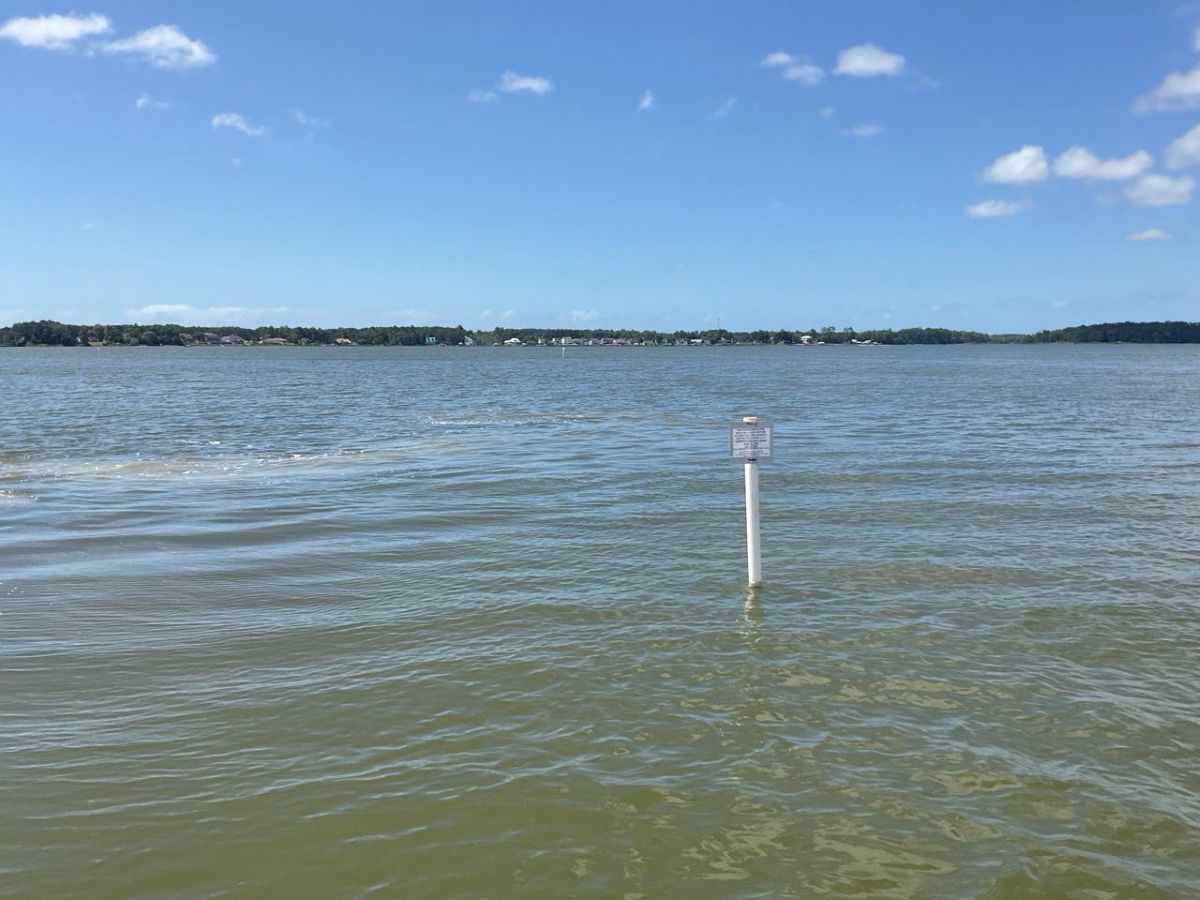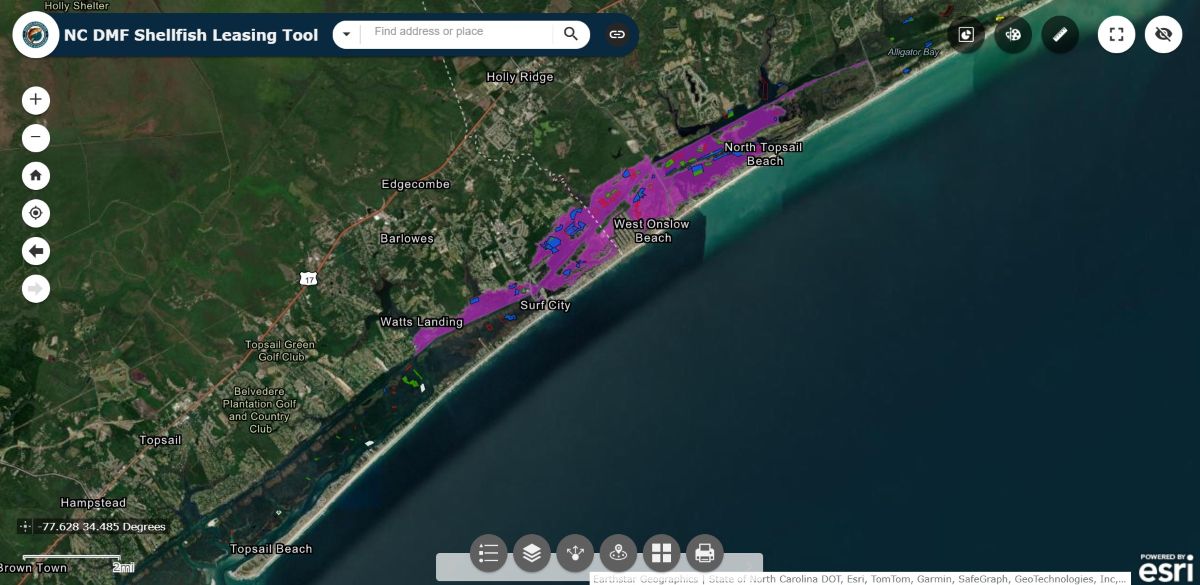
Topsail Island leaders are unwavering in their pursuit of stopping new leases of shellfish farms in the waters around them.
Months have passed since the island’s three towns — North Topsail Beach, Surf City and Topsail Beach — and their respective counties banded together to ask state legislators for a moratorium on new shellfish leases in Onslow and Pender’s coastal waterways.
Supporter Spotlight
“Of course, we all support aquaculture,” North Topsail Beach Alderman Mike Benson said during a recent town board meeting.
But the rising number of leases, fueled because of moratoriums in surrounding coastal counties, has led to what local leaders say amount to mounting conflicts between recreational uses of public waters and shellfish leases that restrict access to those waters.
Prohibiting all new shellfish leases across Onslow and Pender counties could be detrimental to the state’s growing shellfish industry, one that reportedly boasts an economic impact of $30 million annually in North Carolina.
“This industry is a particularly bright spot for North Carolina in that farming clams and oysters is quite sustainable environmentally,” said Dr. Jane Harrison, a coastal economics specialist with North Carolina Sea Grant. “We’ve seen a huge uptick in production numbers from farming oysters, in particular, over the last decade and we don’t want to lose that momentum.”
North Carolina Sea Grant and the North Carolina Coastal Federation have teamed up in hopes of launching a plan that would result in the creation of a Geographic Information System, or GIS, database that pinpoints areas where leases may or may not be suitable in the waterways behind the 26-mile-long island.
Supporter Spotlight
That database would be built by a GIS specialist from North Carolina State University using feedback the organizations aim to get from different focus groups made up of users of those waters, be it shellfish farmers, fishing guides, recreational fishers, or island waterfront property owners.

“We want to bring together many different voices to gather their perspectives and then put their information, their interest, into that GIS database,” Harrison said.
Sea Grant and the Coastal Federation, which publishes Coastal Review, have applied for a grant through the National Oceanic and Atmospheric Administration’s National Sea Grant Office to fund the plan.
If awarded the grant, the plan would kick off around September, when the GIS specialist would gather existing data, including information from the University of North Carolina Wilmington’s Shellfish Lease Siting Tool, to work up a baseline of information that will be presented to focus groups. UNCW’s interactive tool assesses coastal conditions in the state to help shellfish growers locate new or expand current operations.
There would be three focus groups: one consisting of shellfish growers in Pender and Onslow counties, one that includes recreational water users and waterfront property owners in Onslow County, and one that includes those groups in Pender County.
Those groups would be initially separated out “because we want folks to feel like they can fully share whatever their concerns or needs are and we don’t want to create an environment of conflict,” Harrison said. “We just want spaces where people can give us every piece of information they have and then we will digest it, compile it, and then have some community conversations.”
Feedback from those conversations would be gathered and used to create a draft resource use agreement and guidelines for equal water access in partnership with the North Carolina Division of Marine Fisheries.
Once finalized, that resource use agreement and guidelines would be published to the public, where it could be used in other coastal regions in not only North Carolina, but other states.
The proposal has gained traction with local officials. The Topsail Island Shoreline Protection Commission, or TISPC, and the counties, has signaled its support for the plan, Harrison said. The commission is made up of elected officials and local government appointees from the island’s three towns.
In an April 2 letter to the Division of Marine Fisheries, North Topsail Beach highlighted the plan as “another justification for a pause” on new shellfish leases.
“A temporary pause would allow us to evaluate the current situation, develop comprehensive management strategies, and ensure that future growth in the shellfish industry is balanced with the needs of our community and the environment,” the letter states.
The North Topsail Beach Board of Aldermen unanimously agreed to send the letter to the division ahead of its April 22 public hearing on six new proposed shellfish leases in Onslow County.
The hearing is scheduled to be held in person at 6 p.m. at the Holly Ridge Community Center and virtually via Webex.
That hearing will follow one on two proposed shellfish leases in Pender County scheduled for 6 p.m. April 15 at Topsail Beach Town Hall, 820 S. Anderson Blvd., and virtually via Webex.
During the April 2 meeting of North Topsail’s town board, Alderman Benson said the consensus of the island’s shoreline protection commission is that the towns and counties continue their request for a moratorium.
A proposed draft bill for a moratorium was not introduced in either the state Senate by its March 25 deadline or the House as of publication of this report. The deadline for the House was extended to April 10.
“There are 111 leases in Onslow County,” Beson said. “We have 647 acres of land in those 111 leases.”
North Topsail Beach and the northernmost portion of Surf City are in Onslow County.
There are opportunities to identify areas within the waterways of the island that are “truly not well served by shellfish aquaculture,” Harrison said.
“There may be special fishing spots that the charter captains want to make sure they have access to,” she said. “There may be viewsheds that are very important to local residents. We have a lot of successful entrepreneurs in shellfish aquaculture in these two counties and shellfish aquaculture produces seafood that many of us like to eat. At the end of the day, it may be that the industry in Pender and Onslow counties can’t grow at the rate it has been. There might be a need for it to be less expansive because of existing leases and farms. But what I want to steer us away from is just a blanket prohibition, as if no new farm could ever take place in a copacetic way.”







